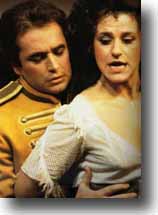Carmen
Royal Opera House, Covent Garden, October 1984

By Alan Blyth, Opera, December 1984
Royal Opera at Covent Garden, October 30--It is the blessing of a great operatic role that there is no one definitive way of performing it. That is possibly truer of Carmen than of almost any other. That 'we can appreciate Agnes Baltsa's earthy, spitfire, all-in interpretation at Covent Garden one season and then adore Teresa Berganza's entirely different reading the next only proves the point. I was apprehensive that my memories of the Spanish mezzo's Edinburgh Carmen, one of the most memorable in my experience, might be dissipated at this somewhat late stage in her career were almost immediately banished by her entrance as the freedom-loving, sensual girl and her smouldering Habanera (happily taken rather quickly in proper opéra-comique manner). They were entirely gone when she reached the Seguidille, where her aristocratic phrasing and wonderfully effective pianissimo beginning created sheer magic in a more easy-going manner than in Scotland. Of course the voice is not large-it never has been that--and, like much else in the evening, would be suited by a smaller house, but the character in her singing, the understanding in her phrasing are unbeatable today, and possibly reached their apex in the Card Scene, for me the real test of a great Carmen. Sung absolutely straight and with interior, tragic feeling, the cries of 'la mort' quite desperate, this was again unforgettable.
The finale was perhaps less of a success. Here you really need the extra decibels available to a dramatic mezzo, and Berganza's chosen hairstyle, surely not that of the original production, here accentuated her rather too mature looks. Indeed this scene belonged to José Carreras, rightly winning him an ovation at curtain call. The sheer desperation of his declamation and of his looks--he even seemed diminished in stature--quite caught the house. He had begun the evening sounding tired and slightly overworked, his performance taking fire somewhere in the middle of the Flower Song, when the real Carreras passion began to emerge, developing through an erotic account of the duet from both artists to a tremendous flaring of temperament in Act 3. Here, too, Valerie Masterson, a little frayed in Act 1, gave us an account of Micaela's aria of French cut, the phrases so clearly defined and delivered that one hardly missed the extra ounce of power this house really calls for.
Giorgio Zancanaro's Toreador was not wholly convincing as a characterisation. He held himself awkwardly and had only a fleeting grasp of French vowels. How odd of Covent Garden to cast this Italian baritone, possibly the best exponent today of Donizetti and Verdi after Brunson, in an unflattering role. Still, one was able to admire, in his last-act exchanges with Carmen, the mellifluous timbre of effortless vocalisation. Odd, too, for the house to employ Cathryn Pope, who should be singing soubrette roles in Cardiff or Glasgow, as its Frasquita, for which she seemed overparted in these surroundings, while Jean Rigby, surely soon-to be the; Coliseum's new Carmen, was a little lost as Mercédès I liked Gordon Sandisan's French-sounding' Moralès.
Quite wrongly, I have left until last the evening's hero--Jacques Delacôte in the pit. Since Beecham's records, I have not heard such an elegant, sensuous account of the score. More than usual, one noticed the sheer beauty of Bizet's scoring, most notably in the Entr'actes, and many of Bizet's subtle underpinning figures, which tell us so much about the characters' motivation, were here given their due. As this was an opéra-comique performance of the Choudens version, with dialogue rather than recitative, the sense of a forward-moving, heady piece of music-theatre was admirably conveyed. Only the house's size was an inhibition.
This page was last updated on: May 17, 2005